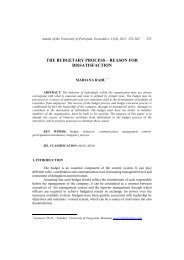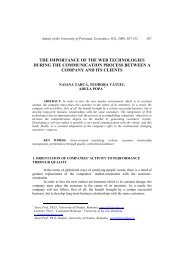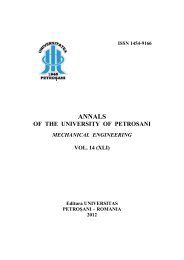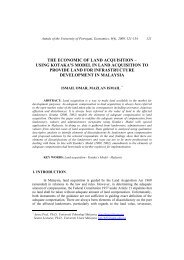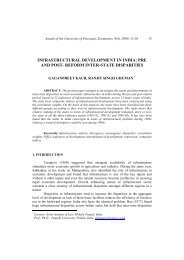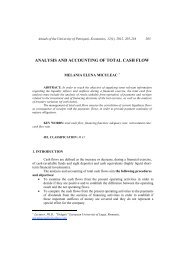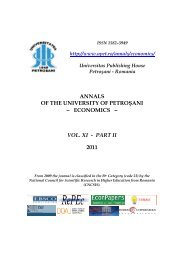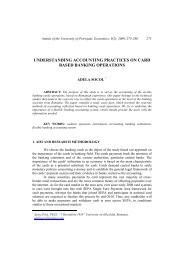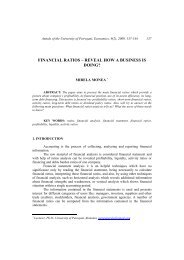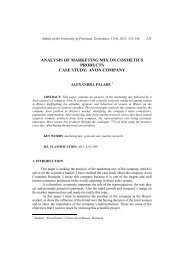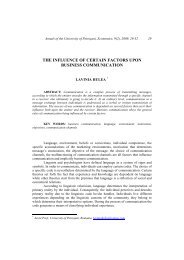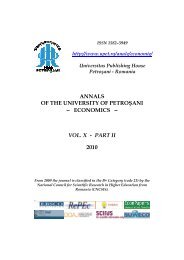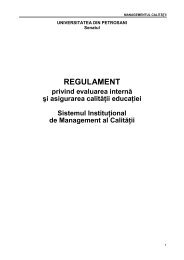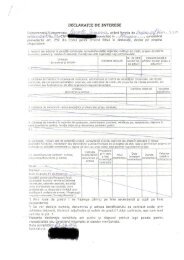annals of the university of petroÅani â¼ economics â¼ vol. xi - part i ...
annals of the university of petroÅani â¼ economics â¼ vol. xi - part i ...
annals of the university of petroÅani â¼ economics â¼ vol. xi - part i ...
Create successful ePaper yourself
Turn your PDF publications into a flip-book with our unique Google optimized e-Paper software.
Internal Controls in Ensuring Good Corporate Governance in … 191<br />
industry because under this situation boards would find it easier to evaluate<br />
performance <strong>of</strong> <strong>the</strong> management. Weibach (1998) tested hypo<strong>the</strong>sis advanced by Fama<br />
(1980) and discovered that outside directors behave differently from inside directors<br />
and behave differently from inside directors and boards dominated by outside<br />
directors performed better that firms with boards dominated by insider directors to<br />
remove <strong>the</strong> chief executive <strong>of</strong>ficer.<br />
RBZ (2004) critique <strong>the</strong> concept <strong>of</strong> multiple appointments, <strong>the</strong> reason being<br />
directors who hold such appointments are ineffective in discharging <strong>the</strong>ir function to<br />
monitor managers. Magaisa (2004) concurred with this view and highlighted that<br />
members who sit on multiple boards do not have enough time to think <strong>of</strong> ways <strong>of</strong><br />
improving <strong>the</strong> institutions in which <strong>the</strong>y lead and it is very difficult for one to have <strong>the</strong><br />
level <strong>of</strong> commitment that is necessary for effective governance to all companies it on<br />
board. King Report (2002) recommended high frequency <strong>of</strong> board meetings per<br />
annum. This suggests that meeting frequency is critical dimension <strong>of</strong> an effective<br />
board. French and Bell (1999) found that board meeting time is an important resource<br />
in improving <strong>the</strong> effectiveness <strong>of</strong> <strong>the</strong> board and most widely shared problem directors<br />
face is lack <strong>of</strong> time to carry out <strong>the</strong>ir duties.<br />
Green (1997) suggested that <strong>the</strong> board and senior management <strong>of</strong> financial<br />
institutions are responsible <strong>of</strong> financial institutions are responsible for promoting high<br />
ethical and integrity standards and for establishing a culture within <strong>the</strong> organization<br />
that emphasis and demonstrated to all levels <strong>of</strong> personnel <strong>the</strong> importance <strong>of</strong> internal<br />
controls. Khan (1994) suggests that an effective internal control system requires that<br />
<strong>the</strong>re are reliable information systems in place that cover all significant activities <strong>of</strong><br />
that bank. The systems must be secured, monitored independently and support<br />
adequate contingency arrangements Deal and Kennedy (1982) argued that effective<br />
internal control systems requires effective communication.<br />
6. RESULTS<br />
Responses were obtained from nine interviews and ten (10) questionnaires<br />
distributed to different banking institutions. Majority <strong>of</strong> respondents (92%) agreed that<br />
effective internal controls are an essential ingredient <strong>of</strong> good corporate governance.<br />
The remaining (8%) was <strong>of</strong> a different opinion saying corporate governance does not<br />
have any relationship with effective internal controls since some banks can outsource<br />
<strong>the</strong> services <strong>of</strong> control de<strong>part</strong>ment.<br />
The argument <strong>the</strong> respondents in <strong>the</strong> affirmative gave was that when <strong>the</strong> firm<br />
adopts sound and effective internal controls it avoids <strong>the</strong> risks <strong>of</strong> poor board oversight<br />
and issue <strong>of</strong> directors who sit on <strong>the</strong> board just to selfishly enrich <strong>the</strong>mselves.<br />
From <strong>the</strong> study, it also emerged that 80% <strong>of</strong> <strong>the</strong> banks have internal control<br />
de<strong>part</strong>ments, which typically includes internal audit, compliance <strong>of</strong>ficer, internal<br />
control unit, transaction authorization and verification. The o<strong>the</strong>r ones did not have<br />
such a de<strong>part</strong>ment and relied on subcontracting services. In seven <strong>of</strong> <strong>the</strong> financial<br />
institutions investigated <strong>the</strong> function <strong>of</strong> <strong>the</strong> control unit were identified as verifying<br />
compliance with regulators, ensuring competences and accuracy <strong>of</strong> financial



